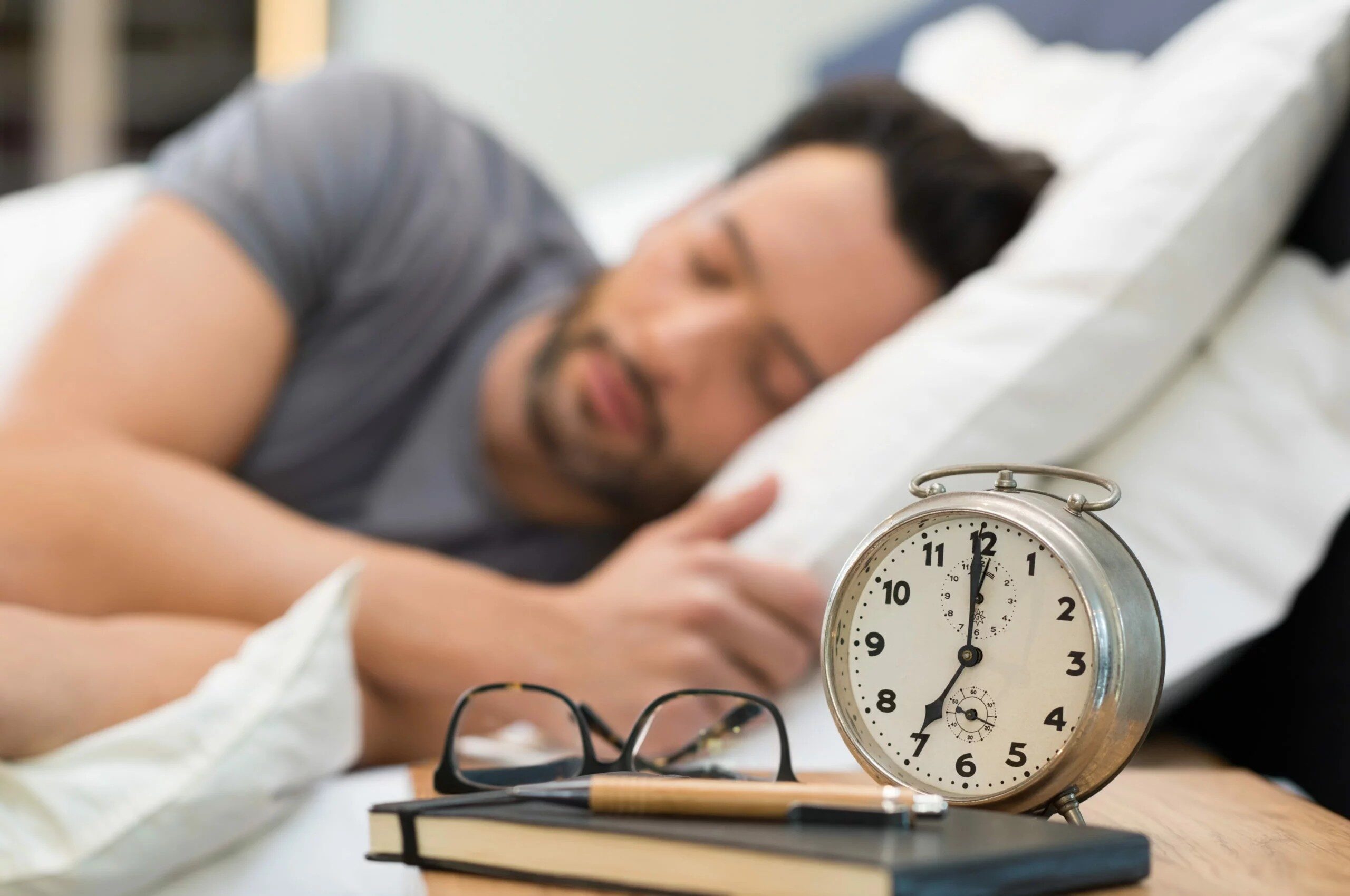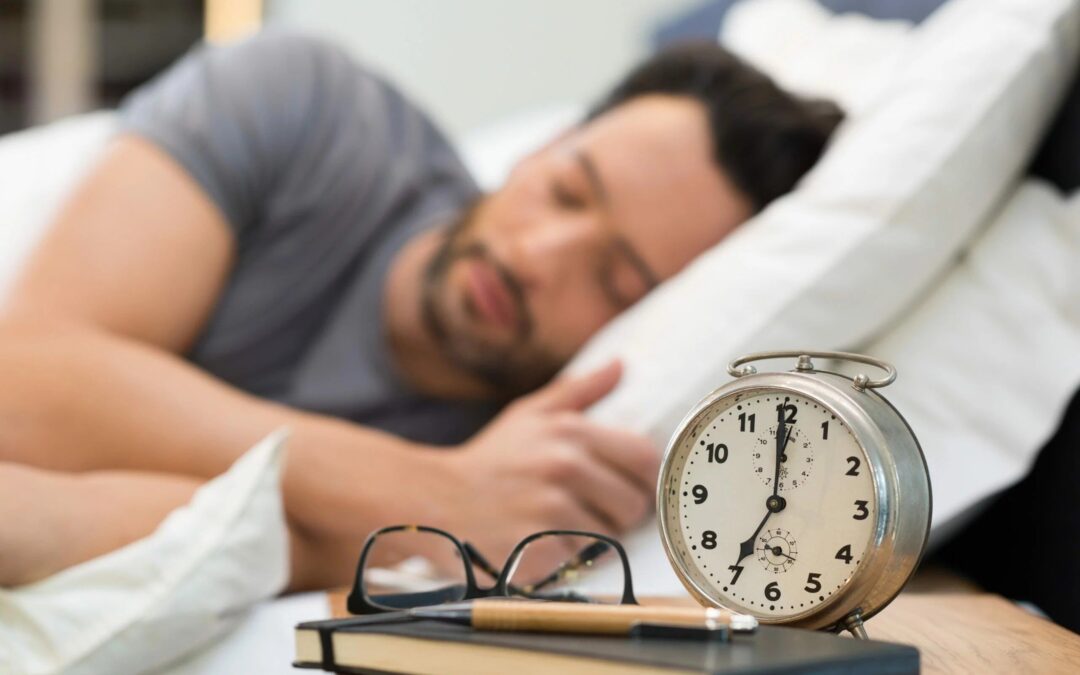
PhotoCredit_Ridofranz_iStock
Melatonin is one of the most popular over the counter sleep aids on the market. But is melatonin bad for you? What are the risks and benefits? We’ll also share about a clinically proven combination sleep aid for those who haven’t gotten the promised results from other sleep aids.
Benefits:
- Sleep Aid: Melatonin is widely used to promote sleep and manage sleep disorders such as insomnia and delayed sleep phase syndrome. It has been shown to help individuals fall asleep faster and improve sleep quality.
- Jet Lag: Melatonin can be effective in reducing symptoms of jet lag by helping to reset the body’s internal clock.
- Blood Pressure and Cholesterol: Some research suggests that melatonin may help lower blood pressure and improve cholesterol profiles, though more research is needed to confirm these benefits.
Risks:
- Side Effects: Common side effects include drowsiness, headache, dizziness, and nausea. These effects are generally mild but can be bothersome.
- Daytime Drowsiness: Taking melatonin can lead to daytime drowsiness, which may impair activities that require alertness, such as driving or operating machinery.
- Interactions: Melatonin can interact with various medications, including blood thinners, immune suppressants, diabetes medications, and contraceptives. It is important to consult a healthcare provider before starting melatonin, especially if you are taking other medications.
Melatonin Safety
Melatonin is a hormone commonly used as a supplement to aid sleep. While generally safe for short-term use, various factors can influence its safety profile, including how it’s taken, how long it’s taken for and your individual health conditions.
Risks of Long Term Melatonin Use
Long-term use of melatonin supplements can potentially disrupt the body’s natural hormone balance. Experts suggest taking melatonin for only one to two months continuously. Using it beyond this period may lead to dependency, causing the body to rely on external supplementation rather than producing melatonin naturally. Individuals using melatonin for extended periods should consult healthcare providers to monitor their sleep patterns and overall health.
Melatonin Short-Term Side Effects
Common short-term side effects of melatonin include dizziness, daytime drowsiness, and headaches. Most users, however, experience minimal to no adverse effects. Taking melatonin at the recommended dosages often helps minimize these side effects. It’s essential to adjust the dosage based on individual responses, as higher doses can exacerbate these symptoms. Monitoring for any reactions when starting melatonin is advisable to ensure safety.
Melatonin Interactions With Medications
Melatonin can interact with various medications, including blood thinners, immunosuppressants, and diabetes medications. Such interactions may either increase the risk of bleeding or alter blood sugar levels. Individuals taking these medications should discuss melatonin use with healthcare providers to avoid adverse interactions. It’s crucial to consider all medications and supplements currently being taken to prevent unforeseen interactions and complications.
When to Stop Taking Melatonin
Stopping melatonin when no longer needed is crucial to maintaining the body’s natural sleep rhythm. If sleep issues persist after one to two months of use, it’s recommended to reevaluate sleep habits or explore other treatments.
Monitoring sleep quality without melatonin can determine if the supplement was effective. Consult a healthcare provider if insomnia or sleep disturbances continue after discontinuing melatonin.
Clinically Proven Alternatives to Melatonin
While melatonin is often suggested for improving sleep quality, alternatives exist that are also clinically proven to aid in sleep without relying on synthetic hormones. Some effective alternatives include natural supplements and formulations designed to promote restful sleep.
MDsleep +hemp Sleep Aid
MDsleep +hemp Sleep Aid combines melatonin-free ingredients to enhance relaxation and support sleeping patterns. It contains hemp extract, known for its calming properties, and blends with natural botanicals. Valerian root and passionflower are prominent components in this formulation. These ingredients have been researched for their soothing benefits. Additionally, this product incorporates magnesium, which can improve sleep quality. By addressing multiple root causes of sleeplessness, this sleep aid provides a holistic approach.
MDsleep Botanical Sleep Aid
MDsleep Botanical Sleep Aid focuses on using plant-based ingredients to support restful sleep. Chamomile, lavender, and lemon balm are some of the key herbs in this formulation. These botanicals are traditionally used for their relaxing properties and ability to reduce anxiety. The inclusion of ashwagandha helps manage stress, contributing to a balanced sleep cycle. This alternative is suitable for individuals seeking an all-natural solution without any hemp derivatives. By leveraging the power of botanicals, it provides an effective option for improving sleep.
MDsleep +hemp Sleep Study
A study conducted on MDsleep +hemp Sleep Aid showed promising results in improving sleep outcomes. Participants experienced significant improvements in their ability to fall asleep faster and stay asleep longer. The hemp and botanical blend was observed to reduce nighttime disturbances and increase sleep duration without morning grogginess. Researchers noted benefiting effects on overall mood and daytime alertness, emphasizing its efficacy as a natural sleep aid. The study provides a credible evaluation of its performance in real-world scenarios, confirming its potential benefits for those with sleep difficulties.
Melatonin Research Summary
Research on melatonin suggests its effectiveness varies by condition, with promising findings for delayed sleep phase and insomnia. Melatonin is a hormone integral to circadian rhythms, affecting how we regulate sleep. Its role in treating sleep disorders, especially in children, jet lag, and shift work, highlights its broad applications.
Melatonin for Delayed Sleep Phase
Delayed Sleep Phase Syndrome (DSPS) affects individuals’ ability to fall asleep at traditional times, often leading to late sleep and wake times. Studies have shown that melatonin supplementation can effectively shift sleep cycles earlier, aligning them more closely with societal norms.
Consistent use of melatonin in the evening may assist in optimizing sleep patterns for those with DSPS, improving both quality and duration of sleep.
Melatonin for Insomnia
Insomnia, characterized by difficulty initiating or maintaining sleep, is commonly addressed with melatonin. For those suffering from short-term insomnia, melatonin has been shown to reduce sleep onset latency — the time taken to fall asleep. It is considered safe for short-term use, making it a viable alternative to traditional sleep medications. Melatonin’s role provides an option for reducing sleep disturbances without the risk of dependency.
Melatonin for Jet Lag
Jet lag results from crossing multiple time zones rapidly, disrupting the body’s internal clock. Melatonin can help realign circadian rhythms, easing adjustment to new local times. Taking melatonin at the destination’s bedtime can reduce symptoms like tiredness and disorientation.
Research supports its use for travelers, helping them synchronize their internal clocks more rapidly and enhancing overall travel experience.
Melatonin for Sleep Disorders in Children
Melatonin is frequently considered for childhood sleep disorders, including autism-related sleep disturbances. Its aid in regulating circadian rhythms can improve sleep duration and quality in affected children. While generally regarded as safe, it’s important to administer melatonin under medical supervision. Doctors often tailor dosages to individual needs, considering the child’s specific sleep challenges and other health aspects.
Role in the Body
Melatonin is naturally produced by the pineal gland, primarily at night. It plays a key role in the regulation of sleep-wake cycles and circadian rhythms. In addition to its sleep-related functions, melatonin is an antioxidant, contributing to cellular protection. Essential for signaling sleep time to the body, its influence extends to mood and immune system regulation.
Melatonin for Shift Work Disorder
Those working non-traditional hours often suffer from shift work disorder, leading to sleep difficulties. Melatonin has been researched as a potential aid, helping align sleep with work schedules by promoting sleep during daylight hours.
While findings are mixed, melatonin remains a valuable tool for many shift workers seeking to enhance sleep quality and decrease fatigue. Medical advice helps ensure appropriate timing and dosage.
Shop MDsleep
Find sleep aids that were designed by doctors and validated by research.
Potential Benefits of Melatonin
Melatonin, a hormone that regulates sleep-wake cycles, is widely used for its potential benefits in treating sleep disorders, managing jet lag, and providing antioxidant effects. It continues to be a subject of study due to its multifaceted health impacts.
Sleep Disorders
Melatonin is primarily recognized for its effectiveness in addressing various sleep disorders. It helps regulate circadian rhythms, making it particularly useful for people with sleep disorders like insomnia or delayed sleep phase syndrome. By mimicking the natural rise of melatonin levels at night, it can help individuals fall asleep faster and improve sleep quality.
Its role in sleep regulation is especially beneficial for those with disrupted sleep cycles. While generally safe for short-term use, it should be taken with caution, especially in specific populations like children and pregnant women.
Jet Lag Management
Jet lag occurs due to rapid travel across different time zones, disrupting the body’s internal clock. Melatonin can aid travelers in adjusting to new time zones by signaling to the body that it is time to sleep. This helps reduce the fatigue and disorientation commonly associated with jet lag.
For optimal results, melatonin should be taken based on the destination’s nighttime hours, assisting the body in aligning with the local sleep cycle. This targeted use underlines its role in mitigating jet lag’s impact more effectively than some other remedies.
Antioxidant Effects
Beyond sleep-related uses, melatonin exhibits significant antioxidant properties. It helps combat oxidative stress by neutralizing free radicals in the body, which supports cellular health and may contribute to overall well-being. Studies suggest that this property could play a role in supporting the immune system and reducing inflammation.
The antioxidant effect of melatonin is still being explored, but its potential to assist in managing certain health conditions highlights its versatility as a supplement. This attribute makes it a subject of interest not only for sleep but also for broader health applications.
Safe Usage Guidelines
Melatonin is generally considered safe for short-term use in adults. It is important to consider dosage and potential interactions with health conditions to ensure safety.
Sources of Melatonin
Melatonin can be obtained from both natural and synthetic sources. Endogenous melatonin is a hormone naturally produced by the pineal gland in the brain and regulates the sleep-wake cycle. Alternatively, melatonin supplements are commonly available over-the-counter in various forms, such as tablets, capsules, and liquid.
The supplements might be particularly helpful for those experiencing sleep disturbances. Recommended dosages often start as low as 0.3 milligrams and can go up to 1 milligram for adults. It’s important to adhere to these guidelines and consult healthcare providers if there are underlying health conditions, such as autoimmune disorders, or if individuals are pregnant or breastfeeding.
Frequently Asked Questions
Melatonin is often used as a sleep aid, but its effects and safety may vary based on several factors. Key concerns include long-term use, potential risks for children, addiction, heart health, negative effects, and impacts on liver or kidney function.
Can long-term use of melatonin cause side effects?
Long-term use of melatonin may lead to side effects such as daytime drowsiness or hormonal changes. Although melatonin is typically safe for short-term use, prolonged consumption without medical supervision is not generally recommended due to potential unknown long-term effects.
Are there any risks associated with melatonin for children?
Children using melatonin should do so under the guidance of a healthcare professional. While melatonin can be beneficial in managing sleep disorders in children, the appropriate dosage and potential long-term implications require careful consideration.
Does regular use of melatonin lead to addiction?
Melatonin is unlikely to cause dependence or addiction, unlike many other sleep aids. This hormonal supplement mirrors the body’s natural production, reducing the risk of developing a habitual dependency.
How does melatonin impact heart health?
Melatonin may have effects on heart health, but research is ongoing. Some studies suggest protective benefits for cardiovascular health, yet individuals with heart conditions should consult their healthcare provider before use.
What negative effects can occur with melatonin usage?
Possible negative effects of melatonin include headaches, dizziness, and nausea. Some individuals might also experience changes in mood or affect. The severity of these side effects varies based on dosage and individual sensitivity.
Could melatonin use be harmful to liver or kidney function?
Evidence on melatonin’s impact on liver or kidney function is limited. While generally considered safe, individuals with pre-existing liver or kidney conditions should use melatonin with caution and seek medical advice prior to starting supplementation.
Read Next
Best Cannabis for Sleep Guide
This resource reviews various cannabis-based sleep solutions, explaining how cannabinoids like THC, CBD, and CBN interact with the body to promote better rest. It provides insights into product types, dosing, and what to consider when choosing cannabis for sleep.
Read more
Types of Sleep Aids
Explore a comprehensive overview of sleep aids, from over-the-counter and prescription medications to natural remedies and sleep hygiene tips. Learn about the benefits, risks, and side effects of common sleep solutions, with guidance on choosing what’s right for you.
Read more
Best Over-the-Counter Sleep Aids Guide
Learn about the most effective over-the-counter sleep aids, including their active ingredients, usage tips, and potential side effects. The guide helps you choose safe and suitable options for occasional sleeplessness or travel-related disruptions. With so many over the counter sleep aids to choose from, find out which ones actually work.
Read more
Guided Sleep Meditation (Audio)
Experience a doctor-designed guided audio sleep meditation that promotes relaxation by progressively releasing tension throughout your body and calming your mind. Visualizations and affirmations help ease you into restful sleep, making it ideal for anyone seeking a peaceful bedtime routine.
Read more
CBN vs. CBD vs. CBG for Sleep Guide
Discover the differences between CBN, CBD, and CBG, three cannabis-derived compounds, and how each may affect sleep quality. The page compares their unique properties, potential benefits, and which might be most effective for sleep support.
Read more
Shop MDBio Nutraceuticals for Sleep, Anxiety Relief, and Pain Relief
Browse MDBio Wellness’s full collection of natural supplements, including sleep aids formulated with botanicals and hemp blends. Each product is designed to support your central nervous system and promote overall well-being without harsh side effects.
Read more

Kia Michel, MD
Physician
Kia Michel, MD is an urologist and staff surgeon at Cedars-Sanai Medical Center in Los Angeles. As a founding member of Comprehensive Urology in Beverly Hills, he believes in treating all aspects of a patient’s wellbeing in order to achieve optimal health. After 25 years in private practice, Dr. Michel believes that a good night’s sleep is essential to maintaining your health, which inspired him to co-create the MDsleep community and the Sleep Doctors Blog.
What Our Readers Say
“Thanks to the insightful articles, I’ve finally managed to get back to my old sleep routine. I feel more rested and energetic each day!”
“The blog’s advice on sleep hygiene has been a game-changer for me. I never realized how small changes could make such a big difference.”
“I struggled with insomnia for years, but the tips I found here have helped me sleep through the night consistently. Thank you!”
“I no longer feel like a zombie from The Walking Dead series! I finally have my life back.”
Stay Updated with Our Newsletter
Join our community of sleep enthusiasts! Subscribe to receive the latest blog posts and exclusive sleep tips straight to your inbox.
Follow Us for More Sleep Insights
Discover Better Sleep Solutions
Unlock the secrets to a restful night by exploring our expert-backed articles and join our vibrant community for personalized sleep tips.
List of References
- AASM Sleep Prioritization Survey: This survey by the American Academy of Sleep Medicine examines the use of melatonin among the public. It reveals trends and insights into how melatonin influences sleep patterns. For more information, visit AASM Sleep Prioritization Survey, Melatonin Use.
- Melatonin Overview: The A.D.A.M. Medical Encyclopedia provides a detailed entry on melatonin, discussing its role as a natural hormone and its applications in treating sleep disorders. More details can be found at Melatonin – MedlinePlus.


